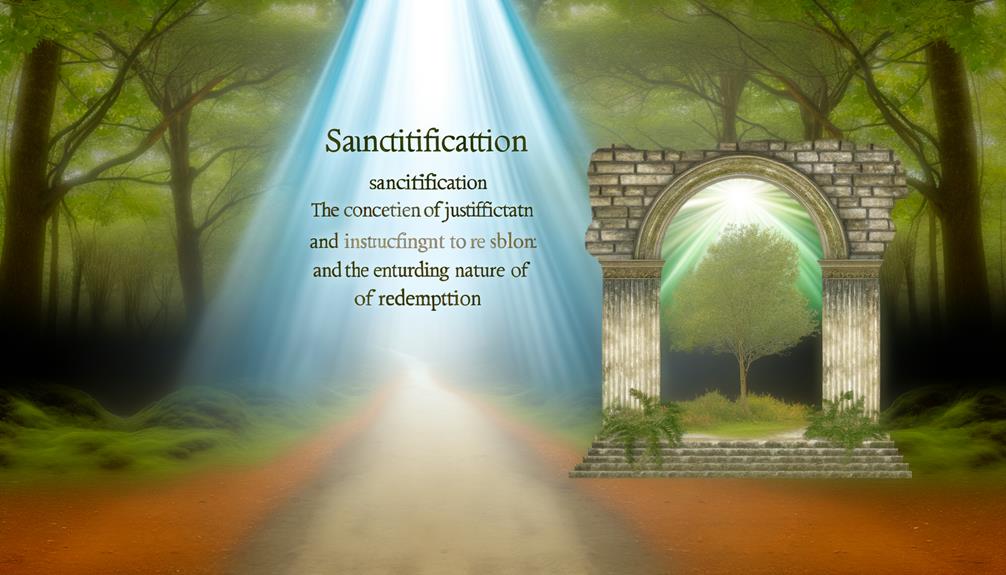Meaning of Sanctification According to the Bible: Growth
Sanctification, according to the Bible, is the transformative process by which believers are set apart for holiness, initiated by faith in Jesus Christ and facilitated by the Holy Spirit’s indwelling presence. It encompasses both an initial act of consecration and a continuous journey toward ethical and spiritual maturity.
Biblical texts emphasize the synergy between divine grace and human responsibility in achieving this state of holiness. With roots in Old Covenant rituals and New Covenant teachings, sanctification integrates positional and progressive aspects of spiritual growth and character reformation, underscoring its significance in the believer’s life.
To grasp its full implications, consider exploring further.

Biblical Meaning of Sanctification: Process and Significance
| Aspect | Description |
|---|---|
| Definition | The process of being made holy and set apart for God’s purpose |
| Biblical References | John 17:17, 1 Thessalonians 4:3, Hebrews 10:10 |
| Key Characteristics | Purification, spiritual maturity, transformation into Christlikeness |
| Importance | Essential for a relationship with God and eternal life (1 Peter 1:16) |
| Process | Begins with justification, progresses through spiritual growth, and leads to glorification |
| Practical Application | Living in obedience, prayer, worship, and aligning with God’s Word |
Definition of Sanctification

Sanctification, as delineated in the Bible, refers to the process by which individuals are set apart and made holy through divine intervention and spiritual transformation.
This transformative journey is not merely an external adherence to religious norms but an intrinsic reformation of the believer’s character and conduct.
The concept encompasses both an initial consecration, wherein one is dedicated to God, and an ongoing maturation process, characterized by increasing conformity to divine principles.
Sanctification involves a synergistic interplay between divine grace and human responsibility, wherein the Holy Spirit’s empowerment enables believers to pursue moral excellence and spiritual purity.
This definition underscores the dynamic and progressive nature of sanctification, reflecting a perpetual movement toward spiritual wholeness and alignment with God’s will.
Biblical Foundations

Examining the biblical foundations of sanctification necessitates an exploration of Old Testament insights, New Testament teachings, and key scriptural references that collectively elucidate this theological concept. The Old Testament provides a background for understanding holiness and the process of being set apart, while the New Testament expands on sanctification through the life and teachings of Jesus Christ, highlighting the transformative power of faith. Key scriptural references, such as Romans 12:1-2 and 1 Thessalonians 4:3, illustrate the practical implications of living a sanctified life. Additionally, exploring the meaning of Sanhedrin in the Bible offers insights into the religious authorities of the time, which played a significant role in shaping the early Christian understanding of holiness and community.
The Old Testament provides initial frameworks and paradigms of holiness, while the New Testament advances these ideas through the life and teachings of Jesus Christ and the apostles.
Key scriptural references across both testaments offer a cohesive and thorough understanding of sanctification’s role and significance in the believer’s life.
Old Testament Insights
In the Old Scriptures, the concept of sanctification is intricately woven into the covenantal relationship between God and His chosen people, Israel.
Sanctification, or ‘qadesh’ in Hebrew, signifies being set apart for divine purposes. This notion finds its roots in the Exodus narrative, where Israel is consecrated as a holy nation (Exodus 19:6).
Ritual purity laws in Leviticus further underscore the importance of holiness in daily life and worship, distinguishing the sacred from the profane.
The prophetic literature, particularly in Isaiah and Ezekiel, emphasizes ethical sanctification, linking moral conduct to divine holiness.
Therefore, Old Covenant sanctification encompasses both ritual and ethical dimensions, reflecting a holistic approach to living in covenant with a holy God.
New Testament Teachings
The New Covenant offers a profound expansion of the concept of sanctification, presenting it as both an accomplished reality through Christ and an ongoing process empowered by the Holy Spirit.
In the New Scripture, sanctification is portrayed as a definitive act achieved through Christ’s atonement, which bestows righteousness upon believers.
Concurrently, it is an experiential journey facilitated by the indwelling Spirit, who cultivates holiness within the believer. This dual aspect underscores sanctification as both positional and progressive.
The transformative process involves a continual renewal of the mind and spirit, aligning believers more closely with God’s will.
This theological framework highlights the integral role of divine grace and human cooperation in the believer’s sanctification journey, reflecting a dynamic interplay between divine sovereignty and human agency.
Key Scriptural References
To better understand the multifaceted nature of sanctification as depicted in the New Scriptures, it is imperative to examine key scriptural references that form the foundation of this theological concept. These passages offer profound insights into the process and purpose of sanctification.
| Scriptural Reference | Key Insights |
|---|---|
| 1 Thessalonians 4:3 | God’s will is our sanctification, emphasizing purity |
| Hebrews 10:10 | Sanctification through the offering of Jesus Christ |
| John 17:17 | Sanctification by truth, highlighting the Word of God |
| Romans 6:22 | Sanctification as a result of being freed from sin |
Each reference contributes to a thorough understanding of sanctification, underscoring its divine orchestration, its basis in truth, and its intrinsic link to moral and spiritual purity.
Role of the Holy Spirit

The Holy Spirit plays a pivotal role in the process of sanctification by empowering believers’ transformation through its indwelling presence.
This divine empowerment facilitates spiritual growth and provides guidance, enabling believers to align their lives more closely with biblical principles.
Consequently, the Holy Spirit’s influence is essential for the ongoing development of Christian character and conduct.
Empowering Believers’ Transformation
Central to the sanctification process, the Holy Spirit empowers believers by initiating and sustaining their spiritual transformation. This empowerment is not merely a passive influence but an active, dynamic force working within the believer.
Scripturally, the Holy Spirit is depicted as the agent of change, transforming the believer’s inner disposition (2 Corinthians 3:18). This transformation involves a progressive process of moral and spiritual refinement, aligning the believer’s character with the image of Christ.
The Spirit’s role is multifaceted, encompassing conviction of sin (John 16:8), renewal of the mind (Romans 12:2), and the production of spiritual fruit (Galatians 5:22-23).
Consequently, the Holy Spirit’s empowerment is essential for actualizing the believer’s sanctified state, making holy living attainable and genuine.
Spiritual Guidance and Growth
Guiding believers through their spiritual journey, the Holy Spirit plays a pivotal role in their growth and maturity.
Biblically, the Holy Spirit is depicted as a counselor, illuminating God’s truth (John 16:13) and fostering spiritual discernment (1 Corinthians 2:14). This divine guidance aids believers in aligning their lives with Christ’s teachings, thereby facilitating sanctification.
The transformative process is further evidenced by the fruits of the Spirit—love, joy, peace, patience, kindness, goodness, faithfulness, gentleness, and self-control (Galatians 5:22-23). These attributes signify internal spiritual growth catalyzed by the Holy Spirit.
Consequently, the Holy Spirit’s role is indispensable in nurturing a believer’s holiness, empowering them to reflect Christ’s character in their daily lives.
Justification Vs. Sanctification

Distinguishing between justification and sanctification is essential for understanding the complete nature of salvation as presented in biblical theology.
Justification refers to the divine act where God declares a sinner righteous by faith in Christ’s atoning sacrifice. This is a one-time legal declaration that changes the believer’s standing before God, absolving sin and imputing righteousness (Romans 3:24-26).
Sanctification, on the other hand, involves the ongoing process of being made holy, reflecting the transformative work of the Holy Spirit in a believer’s life (1 Thessalonians 4:3).
While justification addresses the believer’s position, sanctification pertains to their condition, emphasizing ethical and spiritual growth.
Together, these doctrines underscore the thorough and dynamic nature of biblical salvation.
Progressive Sanctification

Progressive sanctification refers to the continuous and cooperative process in which believers grow in holiness and conformity to the image of Christ through the work of the Holy Spirit.
This dynamic journey involves an ongoing transformation that is neither instant nor passive but requires active participation and submission to divine guidance.
Scriptural references, such as Philippians 1:6 and 2 Corinthians 3:18, underscore the believer’s gradual progression in spiritual maturity.
The Holy Spirit plays a pivotal role by convicting, instructing, and empowering Christians to overcome sin and embody Christ-like virtues.
This process underscores the symbiotic relationship between divine enablement and human responsibility, highlighting the necessity of both grace and effort in the believer’s spiritual development.
Practical Steps

To effectively engage in the process of sanctification, believers must implement practical steps that align their daily lives with biblical principles and spiritual disciplines. These steps serve as a tangible means to foster spiritual growth and deepen one’s relationship with God.
- Daily Scripture Reading – Regular engagement with the Word of God informs and transforms the believer’s mind, aligning thoughts and actions with divine truth (Psalm 119:105).
- Consistent Prayer – Through prayer, believers maintain a direct line of communication with God, seeking guidance, strength, and the Holy Spirit’s continual sanctifying work (Philippians 4:6-7).
- Community Fellowship – Participating in a faith community offers accountability, encouragement, and opportunities for mutual edification, essential for spiritual maturation (Hebrews 10:24-25).
These steps are foundational in pursuing sanctification.
Importance for Believers

Recognizing the importance of sanctification for believers is essential for understanding its role in fostering a deeper, transformative relationship with God and ensuring a life that reflects His holiness. Sanctification is integral in aligning believers’ lives with divine precepts, thereby promoting spiritual growth and ethical living. The ongoing process of sanctification is not merely a doctrinal concept but a lived experience that impacts daily behavior and decisions.
| Aspect | Description |
|---|---|
| Spiritual Growth | Continuous development in faith and character. |
| Ethical Conduct | Living in accordance with biblical moral principles. |
| Relationship with God | Deepening communion and intimacy with God through holy living. |
| Witness to Others | Demonstrating the transformative power of the gospel through personal life. |
Understanding these elements underscores the necessity of sanctification in the believer’s spiritual journey.
Conclusion
Sanctification, as delineated in biblical theology, represents a transformative process wherein believers are progressively conformed to the image of Christ through the work of the Holy Spirit.
Distinct from justification, which denotes a legal declaration of righteousness, sanctification involves ongoing spiritual growth and moral purification.
The theological foundation, supported by scriptural evidence, underscores its necessity for believers.
Consequently, sanctification is integral to Christian life, signifying continuous spiritual maturation and deeper communion with the divine.






